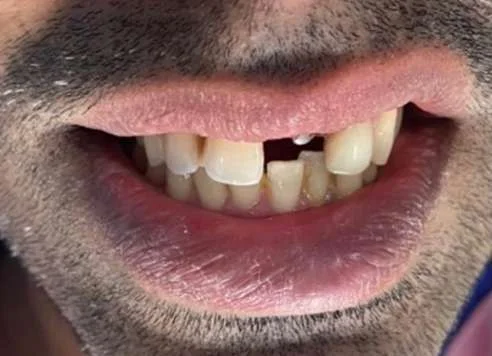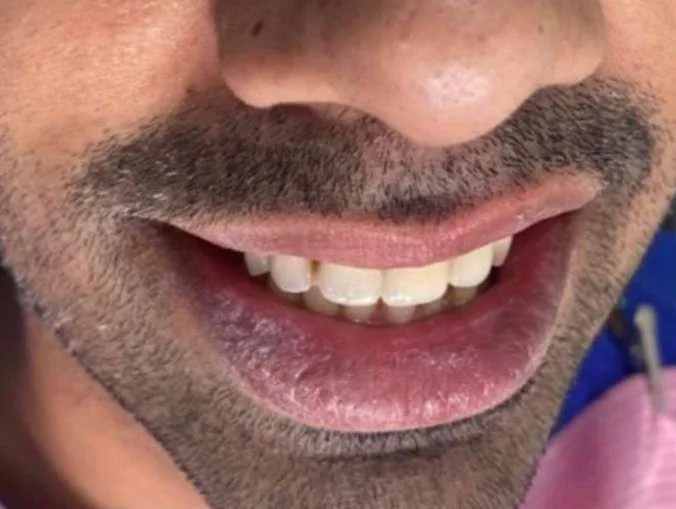
About Dental Implants
Dental Implants, often called “two-piece” implants, consist of two main parts: the root component and the tooth component. The root component, or implant, is inserted into your jawbone, providing a stable foundation. The tooth component, known as the abutment, connects to the implant with a tiny screw and is customized to hold the final crown.
The procedure typically involves a few stages over several months. First, the implant is placed into the jawbone, followed by a healing period of a few months to allow the implant to integrate with the bone. Once healed, the abutment is attached, and finally, the custom crown is placed. Get the best dental implant treatments in Gurgaon at The Dental Cure.
Advantages of conventional dental implants include their durability, stability, and natural appearance. They are a highly effective, long-term solution for missing teeth, allowing you to eat, speak, and smile with confidence.

Implant placement and healing process.

Abutment attachment and crown placement.
Talk To A Dentist
DENTAL
CURE
WONDERING
WHAT IS BEST
FOR YOU?
Types of Dental Implants
Dental implants are suitable for various situations, from replacing one missing tooth to a full set of teeth. Here are the options you can choose from:
All-On-Four Implants
For patients needing to replace a full upper or lower set of teeth, all-on-four implants are a great option. An oral surgeon places four implants and attaches a full arch of teeth to them, providing a stable and effective solution.
Multiple Implants
If you are missing several teeth but still have healthy gums and surrounding teeth, multiple implants might be the best solution. Two fixtures are implanted, and the crowns are attached, leaving your other natural teeth intact. However, even if only a few teeth are missing, an all-on-four procedure may be more suitable. For the best dental implant treatments in Gurgaon, visit The Dental Cure.
Single Tooth Implants
If you've lost a single tooth due to an accident or periodontal disease, a single tooth implant can replace it. Your newly implanted tooth will resemble and perform just like your original teeth. The cost of tooth implants in Gurgaon is quite reasonable, making it an affordable option.
The Dental Cure is one of the best clinics for dental implants in Gurgaon, offering advanced and personalized treatments to restore your smile.
Benefits of Dental Implant
Dental implants offer several benefits that make them a great choice for replacing missing teeth:
- Natural Look and Feel: Implants are designed to look and function like your natural teeth, allowing you to eat, drink, and speak without worry. The implants blend seamlessly with your existing teeth for a natural and attractive smile.
- Strong and Durable: Made from titanium, implants are strong and durable, with no risk of gum irritation or interference with neighboring teeth.
- Effective Long-Term Solution: Implants integrate with the bone over 3-4 months, providing a stable and long-lasting solution for missing teeth. This process ensures the highest standard of treatment and restores full function to your mouth.
- Prevents Bone Loss: Unlike dentures, implants help prevent bone degeneration that can occur after tooth loss, maintaining the integrity of your jawbone.
For the best dental implant treatments in Gurgaon, visit The Dental Cure. Our dental implants are designed to offer a long-lasting and reliable solution, restoring both the function and aesthetics of your teeth, so you can smile confidently again.
We are easily accessible at two convenient locations in Gurugram: one near Artemis Hospital at 1287 XP, Block H, Sector 57 & the other at 59 Akashneem Marg, DLF Phase 2, Sector 25. Whether you are looking for expert care or a clinic close to home, we are here to provide top-quality dental implant treatments.
BOOK AN APPOINTMENTWhat Our Customers Say About Dental Cure
Dental Implant Procedures
Getting dental implants typically requires two trips over 4-6 months. The first trip takes about 3-5 days, and the second trip usually lasts about a week. Here's a simple breakdown of the process:
Step 1: Initial Placement
-
• Tooth Extraction:If needed, the tooth is extracted, and the implant is placed in one visit. Sometimes, artificial bone material is added to ensure there's enough bone to support the implant. This minor bone graft or socket graft can be done during the same appointment. In the upper jaw, if there isn't enough bone, a sinus lift may be performed.
-
• Implant Placement:The implant is screwed into the jawbone, and the gums are sealed over it. This takes about 3-6 months to integrate with the jawbone before it can support the abutment and crown. This initial visit includes consultation, diagnosis, and follow-up for suture removal and post-operative checks.
Step 2: Abutment and Crown Fitting
-
• Stabilization:Once the implant is stable, you return to have the abutment and crown fitted. The gums are opened, abutments are attached, and impressions are taken of the abutments and surrounding teeth.
-
• Crown Creation:These impressions are sent to a dental lab to craft the crowns. This process usually takes about 1-2 weeks. Crowns are fitted over a week.
Frequently Asked Questions
Dental implants are permanent, natural-looking replacements for missing teeth. Unlike dentures or bridges, implants fuse with your jawbone, providing a strong, stable foundation for artificial teeth. They improve chewing ability, enhance speech, and restore confidence with a long-lasting, natural smile.
At The Dental Cure, we use advanced implant technology to ensure seamless, pain-free procedures with high success rates.
Most adults with one or more missing teeth can get dental implants. Ideal candidates should have:
✔ Healthy gums and sufficient jawbone density
✔ No active gum disease or uncontrolled diabetes
✔ Good overall oral hygiene habits
If you have bone loss, we offer bone grafting to prepare your jaw for successful implantation. Book a consultation to determine if implants are right for you!
With proper care, dental implants can last a lifetime. The titanium post fuses with your jawbone permanently, while the crown (artificial tooth) can last 15+ years with good oral hygiene. Regular dental checkups and avoiding habits like smoking will extend their lifespan.
Not at all! The implant procedure is performed under local anesthesia, making it virtually painless. Most patients experience minimal discomfort, similar to a routine tooth extraction. Any post-surgery soreness can be managed with mild pain relievers.
At The Dental Cure, we ensure a comfortable, stress-free experience with advanced sedation options for nervous patients.
The cost of dental implants in Gurgaon varies based on:
✔ Number of implants needed
✔ Type of implant material used
✔ Whether bone grafting or sinus lifts are required
At The Dental Cure, we offer affordable implant solutions with flexible payment plans. Contact us for a personalized cost estimate!
The process usually takes 3 to 6 months, including healing time. Here’s what to expect:
Step 1: Implant placement into the jawbone (healing time: 3-6 months)
Step 2: Abutment placement
Step 3: Custom crown fitting for a natural-looking smile
For some patients, same-day implants may be an option, depending on bone health.
Yes, dental implants are one of the safest and most successful tooth replacement options. With a success rate of over 95%, they are a proven solution for missing teeth. Our expert implantologists at The Dental Cure use high-quality materials and advanced techniques to ensure maximum safety and durability.
Absolutely! Once fully healed, dental implants function like natural teeth, allowing you to eat all your favorite foods without restrictions. Say goodbye to the limitations of dentures and enjoy a strong bite and confident smile.
Caring for dental implants is simple:
✔ Brush and floss daily like natural teeth
✔ Avoid smoking and excessive alcohol
✔ Visit The Dental Cure for routine checkups and professional cleanings
Good oral hygiene ensures your implants stay strong, healthy, and long-lasting.
For high-quality, affordable dental implants in Gurgaon, visit The Dental Cure! Our expert dentists provide personalized care, cutting-edge technology, and pain-free treatments to restore your smile.




